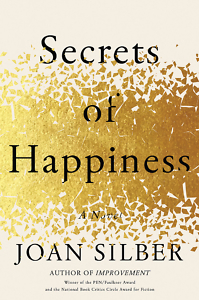Freedom from Delusion
Joan Silber’s characters stumble through work, family, and romance in Secrets of Happiness
At the silent center of Joan Silber’s new novel, Secrets of Happiness, lies the foundational paradox of Buddhism: The more one struggles to achieve contentment, the further it recedes. To reach lasting peace, one must forgo all attachments to the material world.

Among Buddhism’s four noble truths, the freedom from desire is a necessary step on the path to enlightenment, but it’s difficult — like walking along a razor’s edge. To liberate ourselves from want, we must overcome our delusions, but, as Silber demonstrates, those deceptions won’t leave without a fight.
In seven interlocking chapters, Silber’s novel dramatizes the lives of characters at crossroads that force them to reassess their values. Abby, a Manhattan teacher, discovers that her husband of 32 years, Gil, has a second family in Queens. Her bedrock assumptions torn asunder, she decides to take a year-long appointment at a school in Thailand, coincidentally the country where her now ex-husband found the woman who has become the mother of his two additional children. When Gil suffers a stroke, his Thai mistress, Nok (“minor wife,” as Abby calls her), nurses him for the final months of his life, despite his calling her by Abby’s name.
The sudden twists of this chapter, which is narrated by Ethan (Gil and Abby’s eldest child), lead to dilemmas that clarify each character’s priorities. How do the various family members redefine their relationships with Gil? Ethan, a lawyer, visits him but refuses to provide legal advice. Abby sympathizes with Nok but does not offer to help care for Gil. Daughter Allyson, married with two children, dismisses him altogether. “He’s like some unbearable old guy you meet at a party who can only talk about himself and doesn’t even notice that you’re not listening,” Allyson says.
 Allyson may have discovered one of the secrets promised by the novel’s title: to jettison relationships that bring only pain. The narrator of the second chapter, Gil’s and Nok’s son Joe, comes to the same conclusion after bitter experience. His high school girlfriend, Veronica, goes to Michigan for college and ends up marrying the heir to a furniture dynasty. When that marriage ends tragically, leaving Veronica bereft, Joe becomes her knight-errant, her once-and-future lover, only to realize that repeating the past is neither possible nor desirable.
Allyson may have discovered one of the secrets promised by the novel’s title: to jettison relationships that bring only pain. The narrator of the second chapter, Gil’s and Nok’s son Joe, comes to the same conclusion after bitter experience. His high school girlfriend, Veronica, goes to Michigan for college and ends up marrying the heir to a furniture dynasty. When that marriage ends tragically, leaving Veronica bereft, Joe becomes her knight-errant, her once-and-future lover, only to realize that repeating the past is neither possible nor desirable.
Silber illustrates the ways that money mediates human relationships. Joe observes, “One of the big questions of my father’s life had been, ‘What can money buy?’” The answer is mixed: “It bought my mother’s company,” he notes, but it did not cement a bond with their sons. “My brother used to make a point to destroy most of the gifts he gave us.” Joe understands why “all religions hated money.” Finally, though, the problems lie not in money, but in how we misuse it — “operator error,” as Joe puts it.
Money can’t purchase Silber’s characters outright happiness, but it wards off pernicious forms of unhappiness. A similar pattern applies with other conventional vectors of well-being: family, work, romance. Children and parents cause headaches, but having them beats loneliness and existential dread. If family doesn’t fill the void in their hearts, Silber’s characters sometimes find gratifying occupations. When Veronica feels adrift, she wallows in depression until she starts working for a friend’s cake boutique. She doesn’t earn much, but the long hours and beautiful products successfully distract Veronica from the pain of loss.
As for love, Silber depicts it as neither scourge nor panacea, but as a life-phase that one may handle gracefully or botch horrendously, with long-lasting consequences either way. Joe wonders what would have happened if he and Veronica had married as teenagers. They “might’ve made a nest for our stupid young selves,” he thinks. “Rushing into things can be extremely intelligent.” Another young character is astounded that anyone could feel confident enough in love to commit for life. How, she asks, “do people make these colossal bargains about what they decide to put up with?”
Silber’s fictional world is a web of overlapping lives with repeated conflicts and themes, each strand woven skillfully into an integrated whole. As in her previous novel, Improvement, Silber makes dramatic jumps in space and time, chronicling generations of families, lovers, and friends. Each chapter is distinct in its focus and pace — some cover weeks; others, decades — adding details to the overarching structure, which when complete offers a sweeping panorama of the last 60 years.
Among the motifs that provide coherence to the novel is the recurrence of Americans traveling to Asia, for business, pleasure, or pilgrimage. They return with adjusted mindsets, alternate perspectives that enable their worlds to become larger, their vision less provincial. The works of Charles Dickens provide another touchstone, for his portrayals of working-class struggles and of the internecine scheming over inheritance. Shakespeare, too, makes uncredited appearances, subtle reminders that the questions Silber asks, and the wisdom she offers, have existed for centuries.

Sean Kinch grew up in Austin and attended Stanford. He earned a Ph.D. from the University of Texas. He now teaches English at Montgomery Bell Academy in Nashville.


